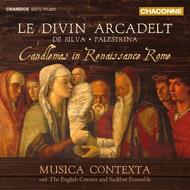
Le Divin Arcadelt (Candlemas in Renaissance Rome)
£14.49
In stock - available for despatch within 1 working day
Despatch Information
This despatch estimate is based on information from both our own stock and the UK supplier's stock.
If ordering multiple items, we will aim to send everything together so the longest despatch estimate will apply to the complete order.
If you would rather receive certain items more quickly, please place them on a separate order.
If any unexpected delays occur, we will keep you informed of progress via email and not allow other items on the order to be held up.
If you would prefer to receive everything together regardless of any delay, please let us know via email.
Pre-orders will be despatched as close as possible to the release date.
Label: Chandos - Chaconne
Cat No: CHAN0779
Format: CD
Number of Discs: 1
Release Date: 3rd May 2011
Contents
Works
Hodie Beata Virgo MariaMissa 'Ave Regina coelorum'
Pater noster
Palestrina, Giovanni Pierluigi da
Diffusa est gratiaSenex puerum portabat
Ave Regina coelorum
Inviolata, integra et casta es Maria
Artists
Musica ContextaEnglish Cornett and Sackbut Ensemble
Works
Hodie Beata Virgo MariaMissa 'Ave Regina coelorum'
Pater noster
Palestrina, Giovanni Pierluigi da
Diffusa est gratiaSenex puerum portabat
Ave Regina coelorum
Inviolata, integra et casta es Maria
Artists
Musica ContextaEnglish Cornett and Sackbut Ensemble
About
The reason for this diversity was that Rome, despite being the main exporter of religious customs, was musically very open to external influences. In a melting-pot of national styles, one of the strongest of these influences came from Iberian musicians such as Andreas de Silva. For a period of two years, de Silva held the position of ‘cantor et compositor’ of the Cappella Sistina in Rome, and it is here, in the Sistine Chapel, that his motet Ave Regina caelorum (recorded here) survives today.
The other great influence on Italian Renaissance music came from Northern France and the Low Countries. Between 1539 and 1551, Jacques Arcadelt was a member of the Cappella Sistina, where he would have come across de Silva’s motet, which he used as the basis for his Ave Regina caelorum mass (also recorded here). A case of plagiarism in today’s eyes, perhaps, but in the Renaissance, Arcadelt’s gesture would have been seen as paying de Silva the highest compliment. Truth be told, there are clear differences between the two: de Silva’s work is more tonally focused, and Arcadelt made several changes to the texture and word-setting.
Also on this disc are two of Arcadelt’s motets, the sumptuous Pater noster and the emotionally charged Hodie beata virgo Maria.
In the year that Arcadelt left Rome to return to France, Palestrina arrived in the city. Part of a growing wave of native Italian musical talent, Palestrina enhanced the religious music scene in Rome with hundreds of compositions, including 105 masses, sixty-eight offertories, including Diffusa est gratia, at least 140 madrigals, and more than 300 motets, among them Senex puerum portabat.
Contents:
Arcadelt:
- Missa ‘Ave Regina caelorum’
- Hodie beata virgo Maria
- Pater noster
Palestrina:
- Senex puerum portabat
- Diffusa est gratia
De Silva:
- Ave Regina caelorum
- Inviolata, integra et casta es Maria
Chant:
- Suscepimus, Deus (Introit)
- Suscepimus, Deus (Gradual)
- Nunc dimittis (Tract)
- Responsum accepit Simeon (Communio)
Error on this page? Let us know here
Need more information on this product? Click here